Founded in 1999 by Chalmers University students, Icomera launched the world’s first onboard Wi-Fi in 2003, revolutionizing connectivity in transit. Evolving from a luxury to a necessity, their services now keep travelers connected globally. We talked to Icomera’s Chief Marketing Officer Paul Barnes, and Head of Sales for the Nordics and Baltics, Carola Delsinger.
Carola Delsinger: ”Icomera was founded by four students of Chalmers University of Technology in Gothenburg in 1999. They developed and deployed the world’s first onboard Wi-Fi service in 2003.
In the years since, fast and reliable connectivity on the go has evolved from being a luxury consideration to an essential service, keeping travellers connected for both work and leisure purposes, and Icomera has become a global company, providing wireless connectivity to the vehicles of many of the world’s leading transport operators.”
What important trends do you see in the development of the railway industry?
Paul Barnes: ”The future of transport will not develop in isolation. It’s important to understand the interplay between every area of modern living as it evolves. There are a number of global trends and challenges that will influence the way we travel over the next decade ranging from pandemics, global conflicts, and climate change, to ageing populations and the blurring of boundaries between the physical and digital worlds.
”The transport industry needs to simultaneously pursue three objectives to attract passengers in a post-pandemic world.”
In order to best serve society in the face of these developments, the transport industry needs to simultaneously pursue three objectives to attract passengers in a post-pandemic world, and meet the increase in demand that comes from shifting society’s travel habits further towards sustainable, green mobility. Firstly, it has to cater for the evolving needs of all business and leisure commuters, regardless of age or disability. Secondly, it must offer a safe environment that guards against physical and cyber threats to individuals and to wider infrastructure. And finally, it has to achieve all this in a cost-effective and resilient way that also allows the industry to adapt to rapidly changing environmental, societal, and economic needs in the future.”
What challenges do your products solve for the customer?
Paul Barnes: ”One thing that many of the technologies and strategies underpinning the future of travel have in common is the importance of, and reliance on, real-time or on-demand access to information for all parties.
With an increasing number of onboard devices or systems requiring connectivity, the increasing value of the data they generate, and the increasing importance of its timely availability, ensuring the reliable and secure transmission of the data that all these systems generate and utilise, to and from the moving vehicle, is key.”
Carola Delsinger: ”Passenger Wi-Fi has historically been the most obvious application for ‘Internet on board’, turning travel time into productive time. But as an increasing number of other onboard systems and services go digital, they too are becoming connected.
Examples we support include personalised journey information delivered in digital formats accessible to those with hearing or visual impairments, allowing them to travel independently.
We’re also supporting the accelerated digitalisation of rail safety and operational efficiency, offering real-time monitoring of vehicle occupancy levels, making it easier for passengers to choose less crowded environments to travel in, and feeding back into operators’ fleet and staff capacity planning.
On-demand remote access to onboard sensor data measuring the condition of infrastructure along a route can also be supported to ensure a resilient and reliable ‘predict and prevent’ maintenance strategies.”
Why is it an advantage to work with companies from Sweden in a global market?
Paul Barnes: ”My Swedish colleagues are too modest to say this but speaking as someone from the UK, I feel Sweden has a well-earned reputation for innovation. It continues to be the top ranked country on the European Innovation Scoreboard, and is third overall according to the Global Innovation Index.
The country is home to some of the world’s biggest technology companies, and I believe it is second only to Silicon Valley in terms of billion-dollar organisations headquartered in an area per capita. That concentration of innovation and talent means that when you work with a company from Sweden, you are tapping into and benefiting from that whole culture.”
”Sweden has a well-earned reputation for innovation. It continues to be the top ranked country on the European Innovation Scoreboard.”
Why are you member’s of Swerig?
Carola Delsinger: ”Between us, Paul and I have worked with Swerig for many years, and we view their team as an extension of our own when it comes to promoting our solutions to national and international audiences.
We are very satisfied that we get great value from the time and other resources we invest in Swerig-related activities. The group is exceptionally well organised, and our interactions have only ever been positive.”






